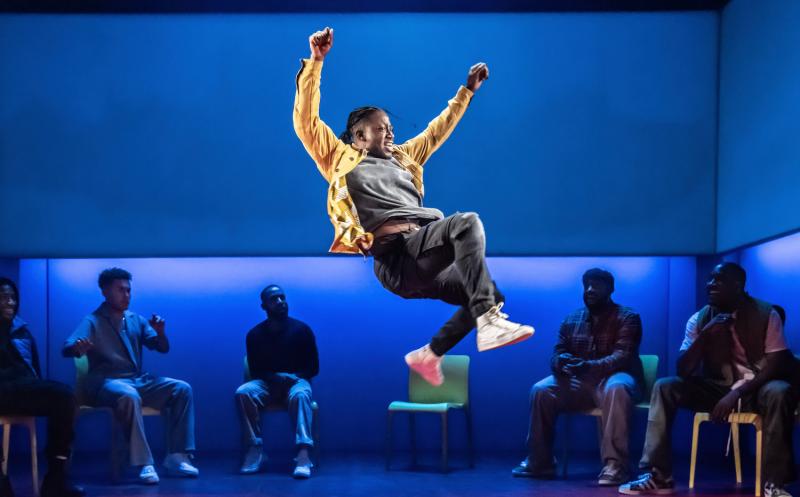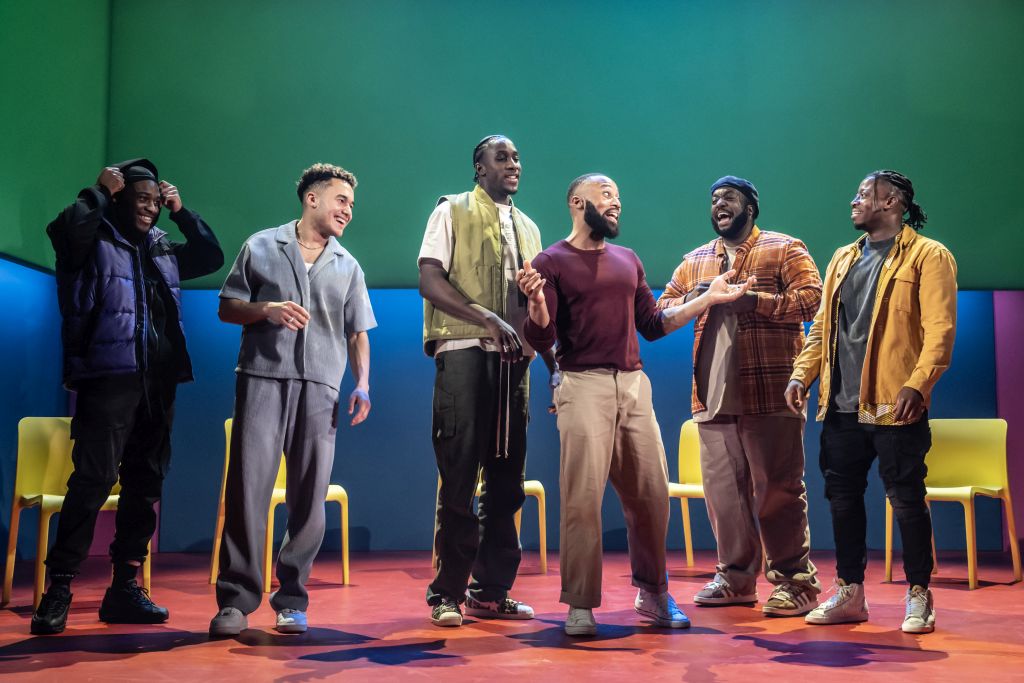For Black Boys Who Have Considered Suicide When The Hue Gets Too Heavy, Garrick Theatre review - exhilarating, moving show makes West End return | reviews, news & interviews
For Black Boys Who Have Considered Suicide When The Hue Gets Too Heavy, Garrick Theatre review - exhilarating, moving show makes West End return
For Black Boys Who Have Considered Suicide When The Hue Gets Too Heavy, Garrick Theatre review - exhilarating, moving show makes West End return
Ryan Calais Cameron brilliantly uses storytelling, music and verse

When For Black Boys Who Have Considered Suicide When The Hue Gets Too Heavy first moved to the West End in 2023, it felt like a risky venture. It had started in the tiny New Diorama, and later packed out the Royal Royal Court, but was a transfer to Shaftesbury Avenue a crazy step too far?
Not a bit of it. The run was a triumph, and now it confidently returns to yet a fourth theatre, with a new cast and all the trappings of a starry first night. It takes its place in a West End that is hosting a particularly adventurous season this spring and is trying to reach out to new audiences. Yes, I know ticket prices are too high, but they are cheaper for this show than most, and worth every penny.
The title sounds gloomy, not to mention the set-up of six young Black men in search of therapy. Director and writer Ryan Calais Cameron was inspired by, and always makes a point of referencing, the American writer Ntozake Shange’s self-described "choreopoem", For Colored Girls Who Have Considered Suicide/When The Rainbow Is Enuf. Cameron has described the years of gestation and research, from first wanting to create a show that explored the experiences of young black men, to being angered by the killing of Trayvon Martin and the acquittal of his killer.
But it's surely impossible to come out of this show without feeling exhilarated rather than depressed. This is my third visit, and each time I’ve been struck by how the piece manages to be both raucous and touching at the same time. That’s partly because of the humour and likeability of the young men depicted, and the skill of the performers as actors, dancers, and singers. The new cast quickly makes its mark. As the curtain rises, the ensemble is glimpsed through the smoky atmosphere, intertwined in a heap on the floor. To the most soulful of music, they gradually disentangle themselves and emerge as individuals against the background of the intense, deep colours of Anna Reid’s set. Their very names denote their blackness: Onyx, Pitch, Jet, Sable, Obsidian, and Midnight. They can dance with all the dazzling discipline and unity of a well-trained chorus, but when they talk, they reveal that their attitudes and experiences are very different. Overwhelmingly, there’s a need to abandon self-hate, to embrace the community and not fall for the stereotypes imposed on them by others but which they also impose on themselves.
The new cast quickly makes its mark. As the curtain rises, the ensemble is glimpsed through the smoky atmosphere, intertwined in a heap on the floor. To the most soulful of music, they gradually disentangle themselves and emerge as individuals against the background of the intense, deep colours of Anna Reid’s set. Their very names denote their blackness: Onyx, Pitch, Jet, Sable, Obsidian, and Midnight. They can dance with all the dazzling discipline and unity of a well-trained chorus, but when they talk, they reveal that their attitudes and experiences are very different. Overwhelmingly, there’s a need to abandon self-hate, to embrace the community and not fall for the stereotypes imposed on them by others but which they also impose on themselves.
At the beginning, the concentration is more on the shared experience, even if their response is different. They speak of being stopped by the police for the crime of being black. Onyx (Tobi King Bakare) brazenly declares: "So why the police gotta go ’round looking to arrest people?! If we need them. We’ll call them innit". That got a loud yell of approval from the audience. Then there’s the horror of Black History Week when they were forced to watch Roots at school. Midnight (Posi Morakinyo) complains, "I couldn’t get my head around why we allowed that to happen". There’s also the pressure to become a Bad Man, and whether to use the N word or not.
Jet (Fela Lufadeju) and Onyx start to talk about their very different relationships with their fathers. Jet’s much-loved father felt such pressure to be a strong man and protect his family that he never admitted he had prostate cancer until it was too late: "I had to choose between my health, and being a man". Onyx’s experience is very different. He and his brother dreaded their father coming home drunk and beating them up, until one day Onyx had had enough and laid his father out flat on the floor. His mother never forgave him, and the experience "taught me what it meant to survive, on unfertile land that/spits out Black boys whole".
Not that they always think of themselves as victims. Albert Magashi’s Sable confesses how much easier it is to leave a woman before she leaves you. Shakeel Haakim’s gentle Pitch struggles to talk to a girl at all. For some time, one wonders why thoughtful Obsidian (Mohammed Mansaray) would feel the need to join a therapy group, until he gives a horrific account of a knife fight that leads to him nursing a frightened, dying boy.
The new actors are in some ways more polished than their predecessors. Midnight may be well over six foot, but the actor playing him moves like an angel. Some rawness has been lost, and some vulnerability. But the strong connection with a largely Black audience is still there, often whooping with recognition.
There was no sense that the Black people in attendance on press night were inhibited by those of us who are white. Maybe it’s because of the success of For Black Boys that Jeremy O’Harris’s Slave Play is finally coming to London. Even Downing Street has weighed in on the decision of that production to hold two "Black Out" performances – two in a run of three months! If it makes some people feel more comfortable and encourages them to attend, that hardly feels like a big deal. In the meantime, For Black Boys roars on, confidently staking its place in the West End.
rating
Share this article
more Theatre
 Testmatch, The Orange Tree Theatre review - Raj rage, old and new, flares in cricket dramedy
Winning performances cannot overcome a scattergun approach to a ragbag of issues
Testmatch, The Orange Tree Theatre review - Raj rage, old and new, flares in cricket dramedy
Winning performances cannot overcome a scattergun approach to a ragbag of issues
 Banging Denmark, Finborough Theatre review - lively but confusing comedy of modern manners
Superb cast deliver Van Badham's anti-incel barbs and feminist wit with gusto
Banging Denmark, Finborough Theatre review - lively but confusing comedy of modern manners
Superb cast deliver Van Badham's anti-incel barbs and feminist wit with gusto
 London Tide, National Theatre review - haunting moody river blues
New play-with-songs version of Dickens’s 'Our Mutual Friend' is a panoramic Victori-noir
London Tide, National Theatre review - haunting moody river blues
New play-with-songs version of Dickens’s 'Our Mutual Friend' is a panoramic Victori-noir
 Machinal, The Old Vic review - note-perfect pity and terror
Sophie Treadwell's 1928 hard hitter gets full musical and choreographic treatment
Machinal, The Old Vic review - note-perfect pity and terror
Sophie Treadwell's 1928 hard hitter gets full musical and choreographic treatment
 An Actor Convalescing in Devon, Hampstead Theatre review - old school actor tells old school stories
Fact emerges skilfully repackaged as fiction in an affecting solo show by Richard Nelson
An Actor Convalescing in Devon, Hampstead Theatre review - old school actor tells old school stories
Fact emerges skilfully repackaged as fiction in an affecting solo show by Richard Nelson
 The Comeuppance, Almeida Theatre review - remembering high-school high jinks
Latest from American penman Branden Jacobs-Jenkins is less than the sum of its parts
The Comeuppance, Almeida Theatre review - remembering high-school high jinks
Latest from American penman Branden Jacobs-Jenkins is less than the sum of its parts
 Richard, My Richard, Theatre Royal Bury St Edmund's review - too much history, not enough drama
Philippa Gregory’s first play tries to exonerate Richard III, with mixed results
Richard, My Richard, Theatre Royal Bury St Edmund's review - too much history, not enough drama
Philippa Gregory’s first play tries to exonerate Richard III, with mixed results
 Player Kings, Noel Coward Theatre review - inventive showcase for a peerless theatrical knight
Ian McKellen's Falstaff thrives in Robert Icke's entertaining remix of the Henry IV plays
Player Kings, Noel Coward Theatre review - inventive showcase for a peerless theatrical knight
Ian McKellen's Falstaff thrives in Robert Icke's entertaining remix of the Henry IV plays
 Cassie and the Lights, Southwark Playhouse review - powerful, affecting, beautifully acted tale of three sisters in care
Heart-rending chronicle of difficult, damaged lives that refuses to provide glib answers
Cassie and the Lights, Southwark Playhouse review - powerful, affecting, beautifully acted tale of three sisters in care
Heart-rending chronicle of difficult, damaged lives that refuses to provide glib answers
 Gunter, Royal Court review - jolly tale of witchcraft and misogyny
A five-women team spell out a feminist message with humour and strong singing
Gunter, Royal Court review - jolly tale of witchcraft and misogyny
A five-women team spell out a feminist message with humour and strong singing
 First Person: actor Paul Jesson on survival, strength, and the healing potential of art
Olivier Award-winner explains how Richard Nelson came to write a solo play for him
First Person: actor Paul Jesson on survival, strength, and the healing potential of art
Olivier Award-winner explains how Richard Nelson came to write a solo play for him
 Underdog: the Other, Other Brontë, National Theatre review - enjoyably comic if caricatured sibling rivalry
Gemma Whelan discovers a mean streak under Charlotte's respectable bonnet
Underdog: the Other, Other Brontë, National Theatre review - enjoyably comic if caricatured sibling rivalry
Gemma Whelan discovers a mean streak under Charlotte's respectable bonnet

Add comment